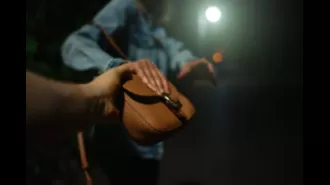Tips for safeguarding your intellectual property while presenting ideas to others.
Protecting intellectual property is just as crucial as promoting your business, project, or initiative.
June 4th 2024.

It's no secret that in today's digital age, creatives and entrepreneurs are utilizing the power of social media apps and digital tools to bring their ideas to life. However, it's important to note that alongside marketing your business or project, protecting your intellectual property is equally crucial.
To gain some valuable insight on how to safeguard your work when pitching to companies or media networks, we sat down with Art Steele, an experienced IP attorney who has been on both sides of the table. Before starting her own law practice focused on creatives and entrepreneurs, Steele spent the early years of her legal career as a tax lawyer, helping multi-million-dollar companies with business restructuring, digital content protection, and complex tax strategies.
So why exactly should small businesses seek the help of an attorney at the start of their journey? Well, for one, business lawyers can help your business thrive. By drafting contracts, you save time, and as they say, time is money. Additionally, having a clear contract in place regarding intellectual property ownership in collaborations can save you from potential legal battles. It's always a good idea to consult with a business attorney before launching your business, as this will give you a better understanding of potential legal issues and when to involve an attorney.
As a creative, you may find yourself pitching your ideas to major media networks, influencers, or brands. But when it comes to protecting your ideas, what should you keep in mind? The key thing to remember is that ideas themselves cannot be protected, only the expression of those ideas can be. This can be done by registering your work with the U.S. Patent and Trademark Office or the U.S. Copyright Office. Registering your intellectual property grants you certain rights and financial remedies if someone were to steal your work.
Another way to safeguard your ideas during a pitch is by having the other party sign a non-disclosure agreement (NDA). However, it's important to consider the stage your idea is at before presenting an NDA. If you have a name, designs, sketches, or mockups, it's a good idea to have the other party sign an NDA. But if your idea is still in the early stages, it may be challenging to get a larger brand to sign an NDA, especially if you're the one pitching to them.
But what happens if a network or brand decides to use your work without giving you proper credit? In these situations, it's always wise to have documentation of your communication. Keep a record of all emails exchanged and any documents sent, along with the date and time. If you have a phone conversation, make sure to follow up with an email summarizing what was discussed. This way, you have proof in case any issues arise.
When it comes to protecting your intellectual property, what's a common mistake you see creatives and entrepreneurs making? The most significant mistake I see is undervaluing their intellectual property. Many small businesses and solopreneurs feel like they're too small and unknown to bother with trademarking or copyrighting their work. However, this mindset can leave them vulnerable to being taken advantage of. Larger brands may try to replicate their work, and without proper protection in place, it can be challenging to fight back.
The best course of action for small businesses is to have the backing of the U.S. federal government and copyright laws in protecting their creative work. This can be achieved by registering trademarks and/or copyright protection and having well-drafted contracts in place.
In recent news, the founder of Urban Intellectuals accused JCPenney of copyright infringement. This serves as a reminder of the importance of protecting your intellectual property and the consequences that can arise if it's not done properly. As a creative or entrepreneur, your ideas are valuable, and it's crucial to take the necessary steps to safeguard them.
To gain some valuable insight on how to safeguard your work when pitching to companies or media networks, we sat down with Art Steele, an experienced IP attorney who has been on both sides of the table. Before starting her own law practice focused on creatives and entrepreneurs, Steele spent the early years of her legal career as a tax lawyer, helping multi-million-dollar companies with business restructuring, digital content protection, and complex tax strategies.
So why exactly should small businesses seek the help of an attorney at the start of their journey? Well, for one, business lawyers can help your business thrive. By drafting contracts, you save time, and as they say, time is money. Additionally, having a clear contract in place regarding intellectual property ownership in collaborations can save you from potential legal battles. It's always a good idea to consult with a business attorney before launching your business, as this will give you a better understanding of potential legal issues and when to involve an attorney.
As a creative, you may find yourself pitching your ideas to major media networks, influencers, or brands. But when it comes to protecting your ideas, what should you keep in mind? The key thing to remember is that ideas themselves cannot be protected, only the expression of those ideas can be. This can be done by registering your work with the U.S. Patent and Trademark Office or the U.S. Copyright Office. Registering your intellectual property grants you certain rights and financial remedies if someone were to steal your work.
Another way to safeguard your ideas during a pitch is by having the other party sign a non-disclosure agreement (NDA). However, it's important to consider the stage your idea is at before presenting an NDA. If you have a name, designs, sketches, or mockups, it's a good idea to have the other party sign an NDA. But if your idea is still in the early stages, it may be challenging to get a larger brand to sign an NDA, especially if you're the one pitching to them.
But what happens if a network or brand decides to use your work without giving you proper credit? In these situations, it's always wise to have documentation of your communication. Keep a record of all emails exchanged and any documents sent, along with the date and time. If you have a phone conversation, make sure to follow up with an email summarizing what was discussed. This way, you have proof in case any issues arise.
When it comes to protecting your intellectual property, what's a common mistake you see creatives and entrepreneurs making? The most significant mistake I see is undervaluing their intellectual property. Many small businesses and solopreneurs feel like they're too small and unknown to bother with trademarking or copyrighting their work. However, this mindset can leave them vulnerable to being taken advantage of. Larger brands may try to replicate their work, and without proper protection in place, it can be challenging to fight back.
The best course of action for small businesses is to have the backing of the U.S. federal government and copyright laws in protecting their creative work. This can be achieved by registering trademarks and/or copyright protection and having well-drafted contracts in place.
In recent news, the founder of Urban Intellectuals accused JCPenney of copyright infringement. This serves as a reminder of the importance of protecting your intellectual property and the consequences that can arise if it's not done properly. As a creative or entrepreneur, your ideas are valuable, and it's crucial to take the necessary steps to safeguard them.
[This article has been trending online recently and has been generated with AI. Your feed is customized.]
[Generative AI is experimental.]
0
0
Submit Comment





